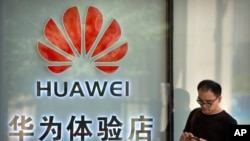Huawei's chief strategist said Tuesday the company would have become the world's number one smartphone maker by the year's end if not for "unexpected" circumstances – a hint that pressure from the U.S. may be hurting its sales.
The comment by Shao Yang at the Consumer Electronics Show in Shanghai comes as Washington intensifies pressure on other countries to exclude Huawei Technologies from next-generation, or 5G, telecom networks where it actually is considered an industry leader.
"If we had not encountered anything unexpected, we would have become number one in the world by the fourth quarter," Huawei's chief strategist, Shao Yang, said at the Consumer Electronics Show in Shanghai.
"But now we have to wait a little bit longer to achieve that," he said, without referring directly to President Donald Trump or the trade war.
Washington last month put Huawei on a blacklist that effectively bars U.S. firms from selling to the company without government approval. The action was part of the broader trade dispute between China and the U.S., which has accused Chinese technology companies such as Huawei of stealing trade secrets and threatening cybersecurity – possibly at the behest of the ruling Communist Party.
Trump has imposed 25% tariffs on $250 billion worth of Chinese exports and is preparing to expand them to cover another $300 billion. He said over the weekend that next step might come if Chinese President Xi Jinping chooses not to meet with him at a summit of the Group of 20 major economies in Osaka at the month's end.
The tariffs war between the two largest economies reflects antagonisms over China's longstanding and huge trade surplus with the U.S. and over Chinese ambitions to help its own industries gain a lead in key technologies such as robotics and artificial intelligence.
Chinese authorities say the United States is exaggerating security concerns to block a potential competitor.
Huawei has denied it would share user secrets with the Chinese government and demanded that the U.S. provide evidence to show that such a risk exists. Earlier, it insisted that the trade friction with Washington was not taking much of a toll on its global business.
But U.S. officials have made it their mission to persuade other governments to avoid working with Huawei, warning that Washington might not share sensitive information with allies if they are using Huawei equipment and networks that the Washington suspects could be compromised.
Huawei vaulted past Apple to become the No. 2 global smartphone brand behind South Korea's Samsung last year, as its total sales surged almost 20% to exceed $100 billion.
Apart from the U.S. pressure, which has effectively shut Huawei out of the world's most lucrative market, growth in smartphone sales overall has been slowing.
Meanwhile, some governments have phone carriers, such as Japan's SoftBank Corp. and KDDI, have delayed sales of Huawei brand smartphones to assess their safety, potentially detracting from earlier forecasts.
In his comments to the electronics show, Shao said the company will march on in its development of the technology.
"People see 5G, but we see beyond that," he said. "Those who are not brave will not progress, they will lag behind. So everything that we do is to define our direction in the new round of competition."








